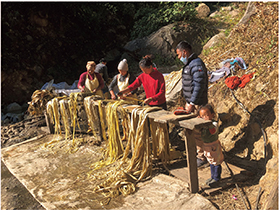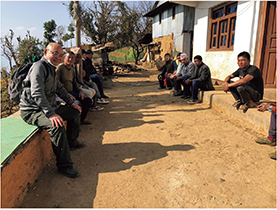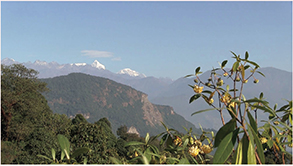MASTER TECHNIQUES from Japan to the World 4
Japanese Company’s Effort to Disseminate Cultivation and Processing Techniques for “Washi” Paper Raw Material “Mitsumata” (Oriental Paperbush) in Its Country of Origin, Nepal

Staff of Kanpou-Nepal giving work instructions to village women (Photo: Kanpou Inc.)

Mr. Matsubara (on the left) holding a meeting with producers (Photo: Kanpou Inc.)

Flowering Mitsumata shrub with the Himalayas in the background (Photo: Kanpou Inc.)
Approximately 80% of the land in Nepal is mountainous, and combined with its geographical constraints as a landlocked country, basic infrastructure is not adequately developed. Agriculture is a major industry in which 60% of the population is engaged, but productivity is low due to a lack of infrastructure and production technology, which is a major cause of poverty in rural areas.
Kanpou Inc. is a Japanese company based in Osaka and engaged in the sale of government publications as well as Mitsumata (Edgeworthia Chrysantha, commonly known as Paperbush and called Argeli in Nepal), a raw material for Japanese traditional paper called “washi.” Faced with this situation in Nepal, the company utilizes JICA SDGs Business Supporting Surveys and transfers technology for the cultivation and processing of Mitsumata in Nepal, aiming to revitalize Nepal’s agriculture and forestry industries and resolve the development challenges.
In Japan, Mitsumata is used as part of the raw material for banknotes since the Meiji era, but domestic production has been decreasing year by year. Kanpou’s first involvement with Nepal was through its corporate social responsibility activity to donate wells, and in 1990, the company began conducting research on Mitsumata in Nepal, where the plant originated. With the aim of revitalizing villages in areas where Mitsumata grows wild, Kanpou started teaching cultivation and processing techniques, and replanting Mitsumata in areas cleared for forest conservation. It then established a local subsidiary and trained Nepali staff, through whom it continued providing technical assistance to contracted farmers.
Mr. MATSUBARA Tadashi, the company’s President and CEO who took over the Mitsumata business in Nepal in 2013, looks back on the earlier days of the project and says, “I will never forget the words of a village elder who said, ‘Thanks to Mitsumata, children in our village are no longer trafficked due to poverty. I myself was able to raise my daughter to become a respectable person.’ When I heard these words, I vowed that I would surely get this project off the ground and eliminate poverty.”
While considering how to continue this business, Kanpou consulted the Embassy of Japan in Nepal, which then referred the company to a JICA project. In 2016, the company began the SDGs Business Model Formulation Survey with the Private Sector to study its feasibility, and since 2019, it implements the “Pilot Project for Establishment of Dissemination Model of High-Quality Mitsumata (Argeli) Production in Nepal.”
Talking about the advantage of utilizing JICA’s public-private partnership support scheme, Mr. Matsubara says, “Poor landless farmers grow Mitsumata on state-owned land with permission from the government. Previously there were many obstacles to continuing their business, such as by having to apply for permission every time the government changed. However, after starting as a JICA project, the permit and approval process was expedited thanks to the network and trust that JICA has cultivated in Nepal. Moreover, we were able to expand the geographical coverage of our activities to regions far away from the capital. Currently, we produce approximately 150 tons of Mitsumata per year at approximately 30 production sites, which is approximately three times the amount produced 10 years ago.” Mitsumata from Nepal is imported to Japan and becomes the raw material for banknotes manufactured by the National Printing Bureau.
This project creates employment opportunities and contributes to women’s participation in society. Regarding the results of the project, Mr. Matsubara explains, “Mitsumata processing does not require large facilities or electric power and can also be easily carried out by women, so it can create jobs for the entire village, encouraging social participation of women. This project also provides employment opportunities to migrant workers who returned home from the capital due to the spread of COVID-19. In addition, it has led to the autonomous operation of the village, as the villagers began to utilize profits from the Mitsumata business for the village, such as for building a school.”
In order to create new jobs and further revitalize the agriculture and forestry industries in Nepal, Kanpou intends to make Mitsumata a specialty of Nepal and considers using the network cultivated through the Mitsumata business to develop new agricultural products. It is expected that this will further create employment for people living in the mountainous regions of Nepal and lead to poverty reduction.
<< Previous Page
Main Text | Reference Statistics | Stories from the Field | Master Techniques from Japan to the World | ODA Topics
